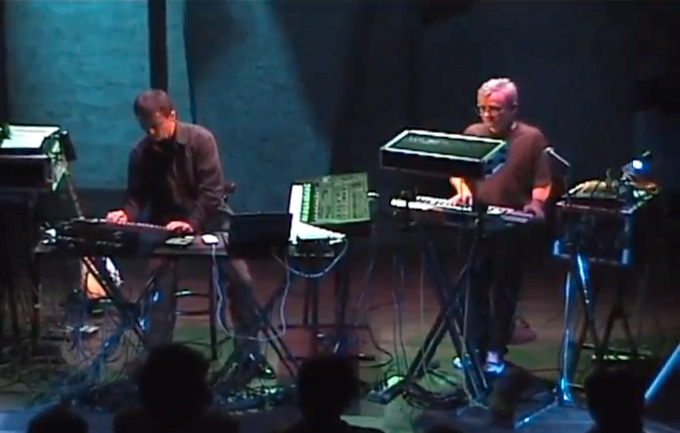|
|
|
|
|||
|
|
|
||||
As a founding member of Kraftwerk, Neu and Harmonia, multi-instrumentalist/composer Michael Rother is a central figure in the story of the somewhat indefinable music of the 1970s which has come to be known by that charming appellation Krautrock. Playing mostly an elegant, spare guitar to the electronic machinations of KraftwerkÕs Ralf Hutter and Florian Schneider, or alongside drummer Klaus Dinger in the coolly propulsive Neu, and later joining ClusterÕs Hans-Joachim Roedelius and Dieter Moebius for the daydreamy textural whims of Harmonia, Rother was a chief architect for a sound that has grown hugely influential on later generations of musicians. That sound ŠŠ in particular his sustained-note, pastoral string work and extraordinarily tasteful leaving-out of notes ŠŠ was further refined and defined on a series of superb solo albums in the mid-'70s done in collaboration with the equally tersely tight Can poly-drummer Jaki Liebezeit. A
few months ago the Grnland label re-released HarmoniaÕs Tracks and
Traces, a
sort of remake/remodel-type collection of the last recordings that Rother,
Roedelius and Moebius did with their friend
Brian Eno in 1976. Long lost
and forgotten, the resurrected tapes of the original sessions
revealed upon close inspection to be a nicely free-flowing and unfussily
avant-garde set of soundscapes. The tapes had been recorded at RotherÕs
longtime farmhouse-studio in bucolic Forst, Germany (where he still
resides), in a low-key, friendly atmosphere of un-goal-oriented musical
exploration. Over the phone from his digs in Forst, Rother gives us a look
at the wherefores and whatsits of the albumÕs genesis and evolution, and
offers a bit of insight into why the music he made more than 30 years ago
sounds ever more relevant today. So some years later I heard from Roedelius, who was in touch with Brian, that the tapes somehow were missing. Brian couldnÕt find them, maybe he didnÕt look hard enough, I donÕt know, but I was very busy, and the fact was that I just had to accept that the tapes were gone. I was sad, but since we originally didnÕt have in mind to release anything, it was just sad that the documents were gone. But in 1997 Roedelius found one of those tapes when he visited Brian and asked him if he could have a look. Because there was some trouble in the band at the time, especially between Roedelius and Moebius, they werenÕt speaking, and I wasnÕt on very good terms with Roedelius either, Roedelius just decided on his own to transfer the four-tracks onto digital media and then mix the recordings. He then sent a CD and said, ŅThis is what I found, and how do you like it?Ó We werenÕt very happy about how that happened, because obviously Dieter Moebius and I would have preferred to join Roedelius in that project, but we couldnÕt really argue about the quality of what he had transferred. |
On Bluefat Channel:
|




